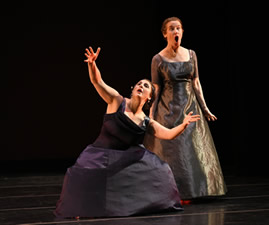It would take someone mighty fussy not to have been powerfully impressed by this production of the Triangle Youth Philharmonic. Conductor (and Artistic Director of the Philharmonic Association) Hugh Partridge brought to the stage of Meymandi Concert Hall some 100-plus young players who sounded like a symphonic group decades their senior. (To give an idea of their tender years, forty of them are about to “age-out” of the orchestra upon graduation from high school.)
The appreciative audience experienced their quality immediately with the opening “Sundays at Shackleford Banks” by Terry Mizesko of the North Carolina Symphony. This cheerful, pastoral piece received its premiere performance by the predecessors of this very same group exactly seven years ago. The treatment of this superior work was totally satisfying as Partridge and the players exploited its sumptuous orchestration with confidence and zeal.
In the past few weeks Triangle audiences have heard two top-flight professional clarinetists, Dave Bennett in Cary and Andrew Lowy in Raleigh. But that fact did not seem to faze Samuel Sparrow, clarinetist with the Philharmonic. He was up to the demands of Debussy’s “Première Rhapsodie” for clarinet and orchestra. This highly honored player’s graceful touch precisely complemented Debussy’s lean orchestration.
You’d be hard pressed to find a more ambitious and successful production than the work that followed intermission. Job – a Masque for Dancing by Vaughan Williams is an elaborate ballet of nine scenes from that earliest-known foray into the complex theological discipline now called theodicy. Supplementing the work were numerous projected screen images from poet/artist William Blake’s Illustrations of the Book of Job. These images proved quite useful in keeping the audience up-to-the-minute throughout all the scenes.
Scene I: “Saraband of the Sons of God,” introduced the composer and his “signature” abundant sound, strains possibly inspired by his great “London Symphony.” Having received permission from God to persecute Job, the evil one launches Scene II: “Satan’s Dance of Triumph.” (Satan is hell-bent on breaking Job’s resolve to remain righteous, but he has a devil of a time pulling it off.) Here the huge forces really came on strong. This fiendish music sounded downright, well, satanic. Could the composer have been thinking back a hundred years to Berlioz’s “Symphonie Fantastique?” Further scenes and dances carried the ancient story along, all the while assisted by the ever-changing images. The action in “Job’s Dream” is reminiscent of the earlier “Satan’s Dance.” Job’s “comforters” eventually came on to minister to him in his afflictions. With comforters like that, who needs tormentors? The scenes continued playing out roughly according to this seminal study of why bad things happen to good people. Scene IX: “Epilogue” presented the denouement wherein Satan is vanquished and Job is restored to even more glory than he formerly enjoyed.
The solo violin work of Associate Concertmaster Aria Cheregosha in one of the scenes was near flawless. It would be difficult to overstate the effectiveness of the Triangle Youth Philharmonic in this magisterial number. Let’s put it this way: If you were cut off from view, would you ever remotely suspect that here was an organization whose “veterans” were still in high school?
Part two of this spring’s pair of concerts will be presented on April 30. See the sidebar for details.











